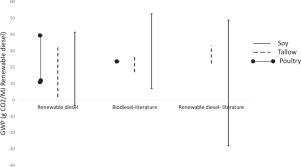Resources, Conservation and Recycling ( IF 13.2 ) Pub Date : 2020-06-08 , DOI: 10.1016/j.resconrec.2020.104944 Bahar Riazi , James M. Mosby , Byron Millet , Sabrina Spatari

|
We investigate the use of rendered poultry fat, beef tallow, and soybean oil as ready sources of free fatty acids (FFAs) and triglycerides (TG) for conversion to renewable diesel. Laboratory scale saponification and decarboxylation experiments using trilaurin, lauric acid, protein, and water as a model compound representing rendered animal fat are reported and combined with chemical process simulations, and thermodynamic and kinematics equations to build energy and material balances where Ab Initio methods are used for estimating missing data to build a life cycle inventory model. Life cycle greenhouse gas (GHG) emissions for producing renewable diesel from soybean oil, poultry fat, and beef tallow fall between −8.7 and 47.2 g CO2 equivalent/MJ even considering induced land use change when soybean oil is used as feedstock. Emissions vary depending on co-products and allocation rules used, which can affect compliance with energy policies.
中文翻译:

来自油脂和动物脂肪废物的可再生柴油:原料,技术,副产品和ILUC对生命周期GWP的影响
我们研究了将提炼的家禽脂肪,牛脂和大豆油用作游离脂肪酸(FFA)和甘油三酸酯(TG)的现成来源,以转化为可再生柴油。报告了使用三月桂酸酯,月桂酸,蛋白质和水作为代表动物油脂的模型化合物的实验室规模的皂化和脱羧实验,并将其与化学过程模拟,热力学和运动学方程相结合,从而在使用Ab Initio方法的情况下建立了能量和材料平衡用于估计丢失的数据以建立生命周期清单模型。用豆油,家禽脂肪和牛脂生产可再生柴油的生命周期温室气体(GHG)排放量介于-8.7和47.2 g CO 2之间当使用大豆油作为原料时,即使考虑到引起的土地利用变化,也要达到当量/ MJ。排放量取决于所使用的副产品和分配规则,这可能会影响对能源政策的遵守。


























 京公网安备 11010802027423号
京公网安备 11010802027423号